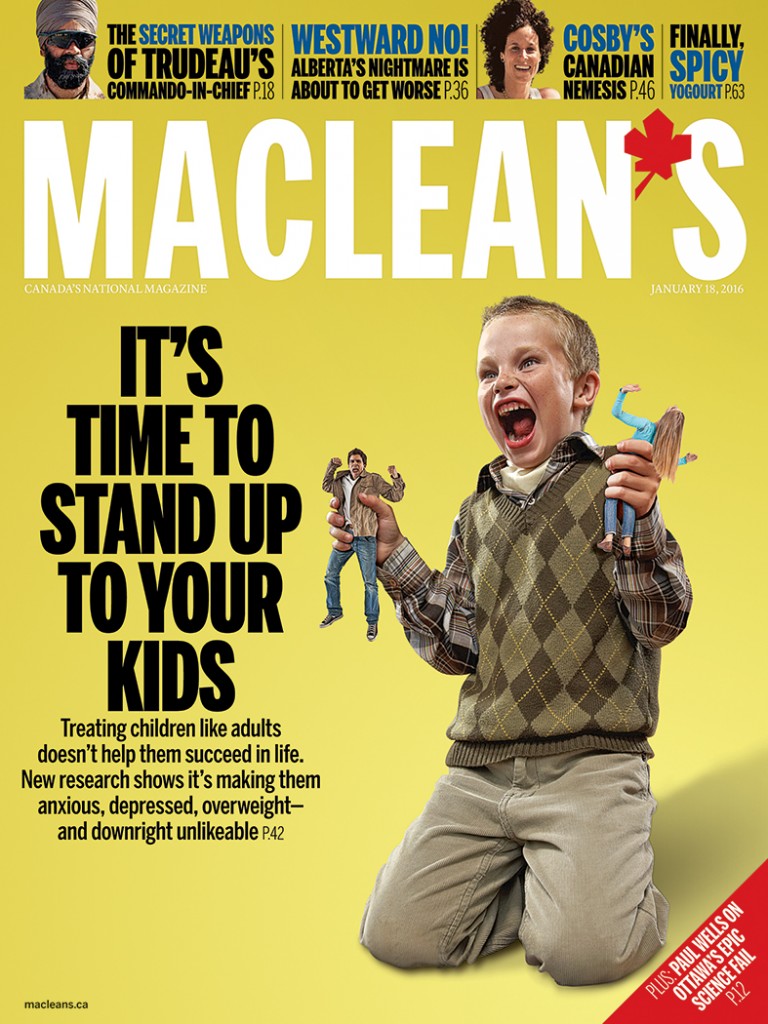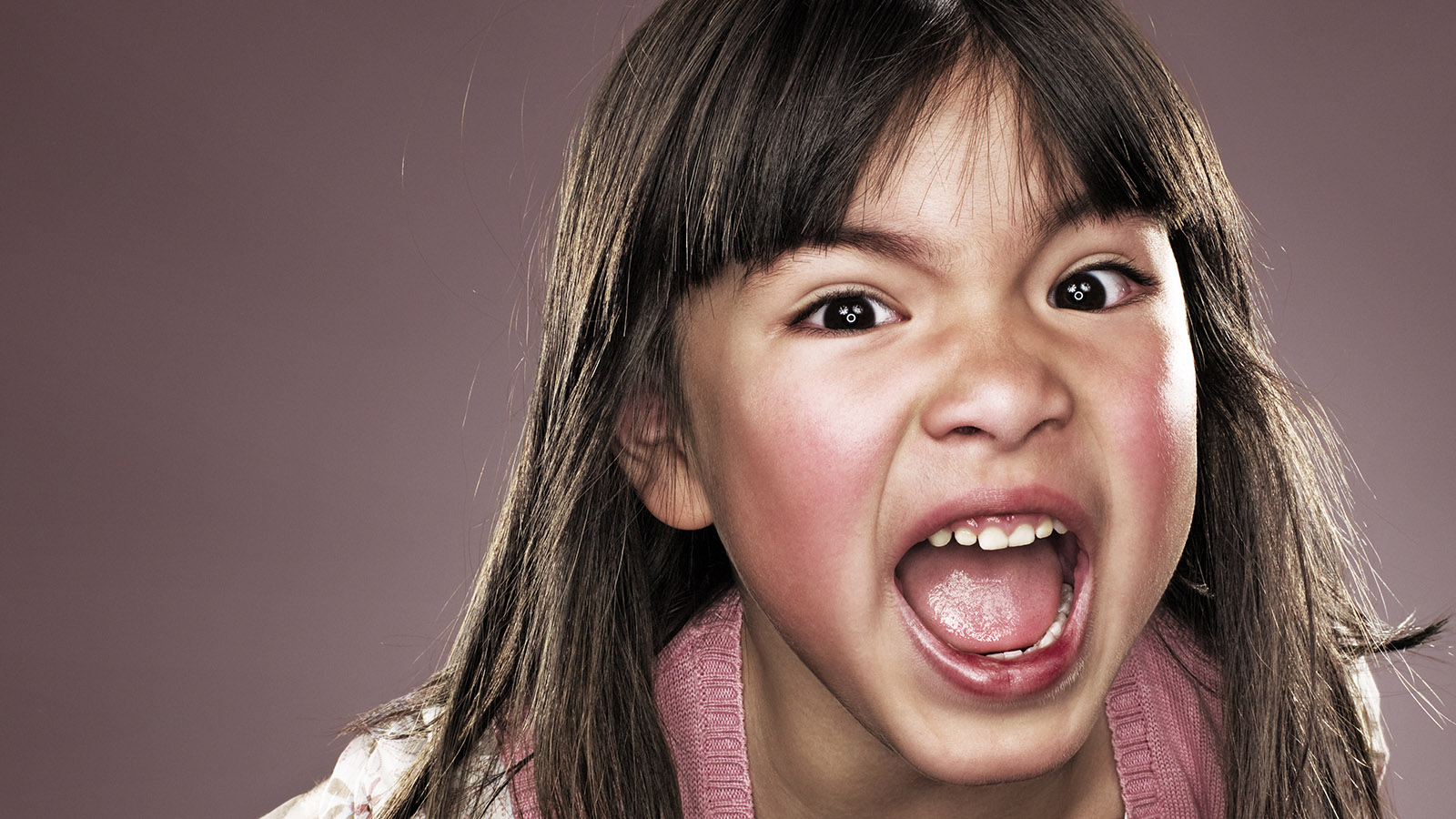The Collapse of Parenting
January 19, 2016

Mainstream magazine affirms
the importance of parental authority
"A functional family unit hinges on the
one social construct
that contemporary society
has been working hard to dismantle: hierarchy."
By Cathy Gulli
The Collapse of Parenting: Time for Parents to Grow Up
(Excerpts by henrymakow.com)
A functional family unit hinges on the one social construct that contemporary society has been working hard to dismantle: hierarchy. "You need a strong alpha presentation to inspire a child to trust you and depend upon you," says [Vancouver psychologist, Gordon] Neufeld of parents. "If we don't have enough natural power then we're hard-pressed to [make] the demand or [set] the limit" for children. "The parent always has to be honoured as the ultimate person," he continues. "We need to put parents back in the driver's seat." ...
That's partly why a
"culture of disrespect" has sprouted in North America. As kids
have become less attached to and influenced by the adults in their
lives, same-age peers have come to matter more to them. It's a
theme in Neufeld's book, Hold On to Your Kids: Why Parents Need
to Matter More Than Peers, co-authored by Dr. Gabor Maté. Young
children "are not rational beings," says Neufeld. Part of growing
up is testing boundaries; little ones, by their very nature, can't
be relied on to hold each other accountable--nor should they.
"Kids are not born knowing right from wrong," says [PA psychologist Leonard] Sax, pointing to studies showing that children who are left to discover right from wrong on their own are more likely to have negative outcomes in the future: "That child in their late 20s is much more likely to be anxious, depressed, less likely to be gainfully employed, less likely to be healthy, more likely to be addicted to drugs or alcohol. We now know this," he says. "Parents who are authoritative have better outcomes, and it's a larger effect than the effect of race, ethnicity, household income or IQ."
LEARNED HELPLESSNESS
That pull and push moms and dads feelÂ--between caring about how other parents are raising their kids while rejecting the constant comparisons--defines this generation of parents for better and worse. Katie Hurley, a psychotherapist in Los Angeles and author of The Happy Kid Handbook: How to Raise Joyful Children in a Stressful World, says, "We've been conditioned to question ourselves--to constantly look for information to make sure we're doing it right. Because of that, parents are in a state of learned helplessness."

So what are people supposed to do? The answer is so basic that at first it might seem unsatisfying: For starters, says Hurley, realize that "nobody knows what they're doing when they leave the hospital with an infant. Every parent learns by trial and error"--every year of their child's life, and with every child they raise. That's as true today as it ever was, and parents who recognize this will shed some guilt and anxiety.
Building on this idea, [London Ont. psychotherapist, Andrea] Nair says that parents must "have a higher tolerance for things not going well." How they recover from their own occasional mistake, outburst, loss of patience or bad call may say more to a child than how they are in happy times. "We're missing that opportunity, which is how learning works," she says. "That's how we become more confident."
A significant portion of Sax's book is devoted to the importance of parents modelling traits they want to encourage in their children. Chief among them, he says, should be humility and conscientiousness--which run counter to inflating a child's self-esteem and sense of entitlement. To that end, he encourages parents to fortify their adult relationships so they are not overly concerned with pleasing their kids as a way of satisfying their own need for affection. Neufeld also urges parents, including his own adult children, to establish a network of surrogate caregivers--relatives, neighbours, daycare workers--who will not undermine their authority but back them up when they need help.
And invariably, they will. "Parenting is awfully frustrating and often a lonely place," says Neufeld, especially when a child misbehaves. In those moments, he recommends parents reassure kids that their relationship isn't broken. "When parents realize that they are their children's best bet, it challenges them to their own maturity." It gives them the confidence that they know what's good for their kids, and that they should stand up to them--this is, in fact, an act of love required of parents. They become, in effect, the grown-ups their children need.
---
New First Comment from Stephen Coleman:
There is a huge problem not mentioned in this article and that is the state. The laws are such that if a child is disciplined the parents could face arrest, costly legal fees and possible jail time. Child Protective Services can arrest you for having dirty dishes in the sink, they can take your kids away for any excuse they make up. Then the court fight can go on until the child is an adult and no longer remembers who the parents are.
I consider CPS to be a New Age Gestapo. They get state money for every child they "save".
I overheard in a shopping mall a teen girl threatening her mother that if she didn't buy her a dress she will call (while waving her cell phone) CPS right now. The mother bought the dress.
The law can turn snotty little teens into demanding tyrants and the parents powerlessly live in terror of the law. They could accuse you of abuse and not have any reason at all. In juvenile cases the adult has to prove his innocence, the state does not have to prove your guilt. They actually teach the students this in public schools.
Don't think you are safe because you are Christian and properly taught respect. In my opinion Christians are a fun challenge to CPS.
--







Ken Adachi said (January 21, 2016):
Tony Blizzard's fabulous commentary is a far more cogent, important, and profound understanding of the topic than is the 'psychologized', sterilized, Dr Joyce Brothers-version expressed in the article.